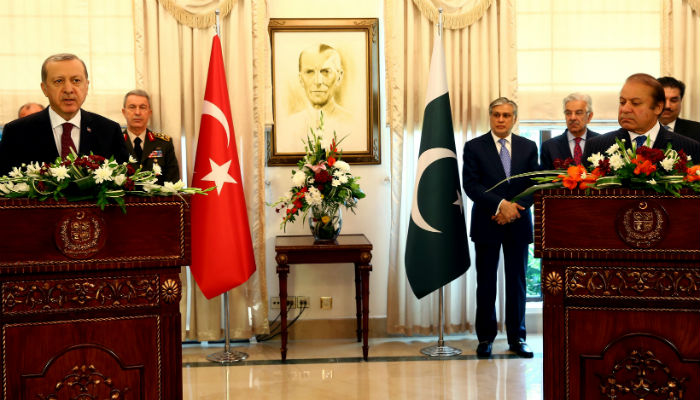President Recep Tayyip Erdoğan on Thursday criticized some Pakistani media outlets and journalists who have voiced their unease with the Pakistani government’s recent decision to deport teachers who work at PakTurk schools in the country, which are affiliated with the faith-based Gülen movement.
On Tuesday the Pakistani government asked teachers who work at 23 schools affiliated with the Gülen movement in the country to leave Pakistan by Nov. 20.
A total of 108 teachers are working at Gülen-affiliated schools in Pakistan, which operate under the name of PakTurk International Schools and Colleges. They have been asked to leave the country with their families, numbering 450 people in total.
The decision of the Pakistani government , which was announced by the country’s Interior Minister Chaudhry Nisar Ali Khan during a live TV program, attracted criticism from some in Pakistan who said it was unfair to bow to the Turkish government pressure and deport Turkish teachers from the country who taught Pakistani children for years.
Erdoğan, who began a two-day visit to Pakistan on Wednesday, said during a speech in the country on Thursday: “The expressions of innocence on the part of some columnists that appeared in the Pakistani press today are unacceptable. I felt upset when I read them.”
The Turkish president said the Maarif Foundation, established by the Turkish government in order to compete with Turkish schools abroad established by Gülen movement sympathizers, will cooperate with the Pakistani Education Ministry to continue teaching Pakistani children.
PakTurk International Schools and Colleges posted a statement on its website on Tuesday voicing concerns about the decision of the Pakistani government with regard to the Turkish teachers working at these schools in Pakistan.
Erdoğan also thanked the Pakistani government for ordering the Turkish teachers in the country to leave Pakistan by Nov. 20, saying he hopes the attitude of Pakistan will set an example to other countries where there are also Turkish schools opened by Gülen followers.
Turkey survived a military coup attempt on July 15 that killed over 240 people and wounded more than a thousand others. Immediately after the putsch, the government along with President Erdoğan pinned the blame on the Gülen movement.
Despite Turkish Islamic scholar Fethullah Gülen, whose views inspired the movement, and the movement having denied the accusation, Erdoğan — calling the coup attempt “a gift from God” — and the government launched a widespread purge aimed at cleansing sympathizers of the movement from within state institutions, dehumanizing its popular figures and putting them in custody.
About 110,000 people have been purged from state bodies, in excess of 80,000 detained and over 36,000 have been arrested since the coup attempt. Arrestees include journalists, judges, prosecutors, police and military officers, academics, governors and even a comedian. Critics argue that lists of Gülen sympathizers were drawn up prior to the coup attempt.

